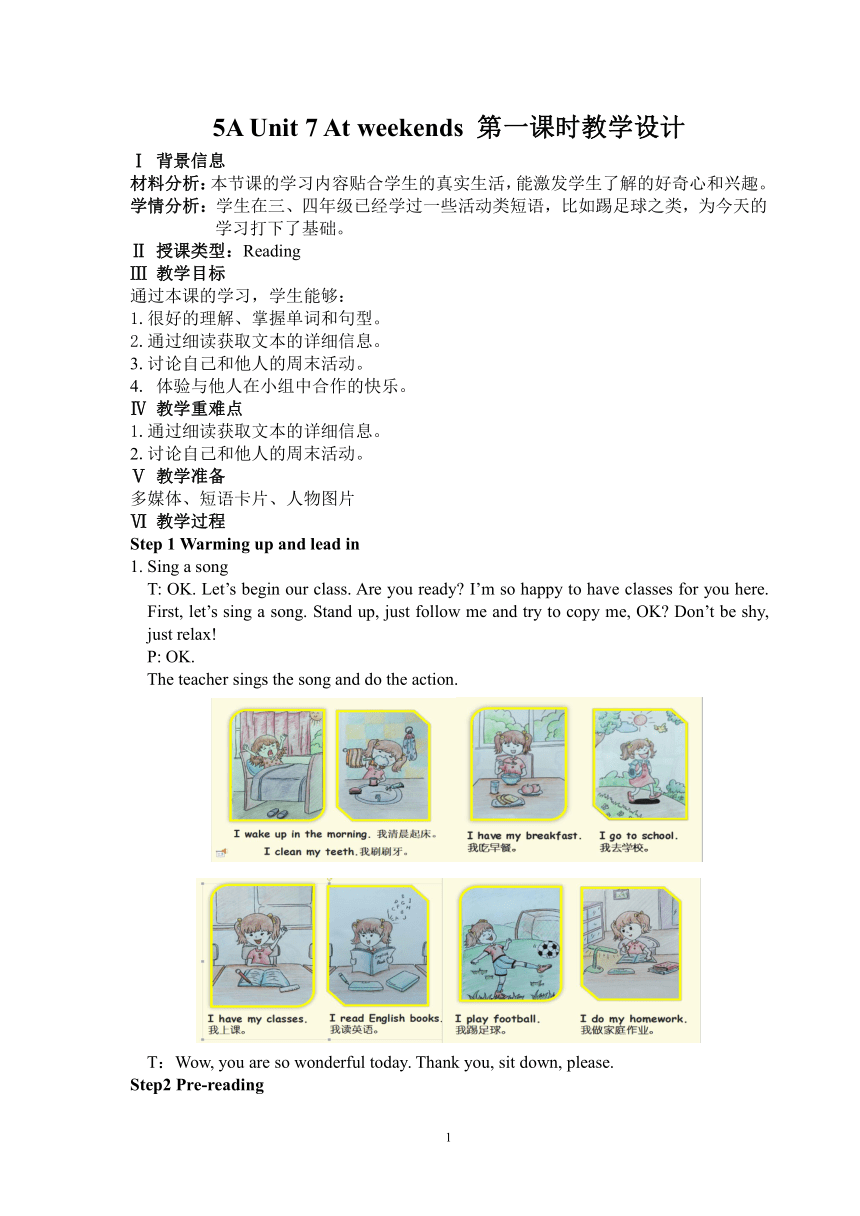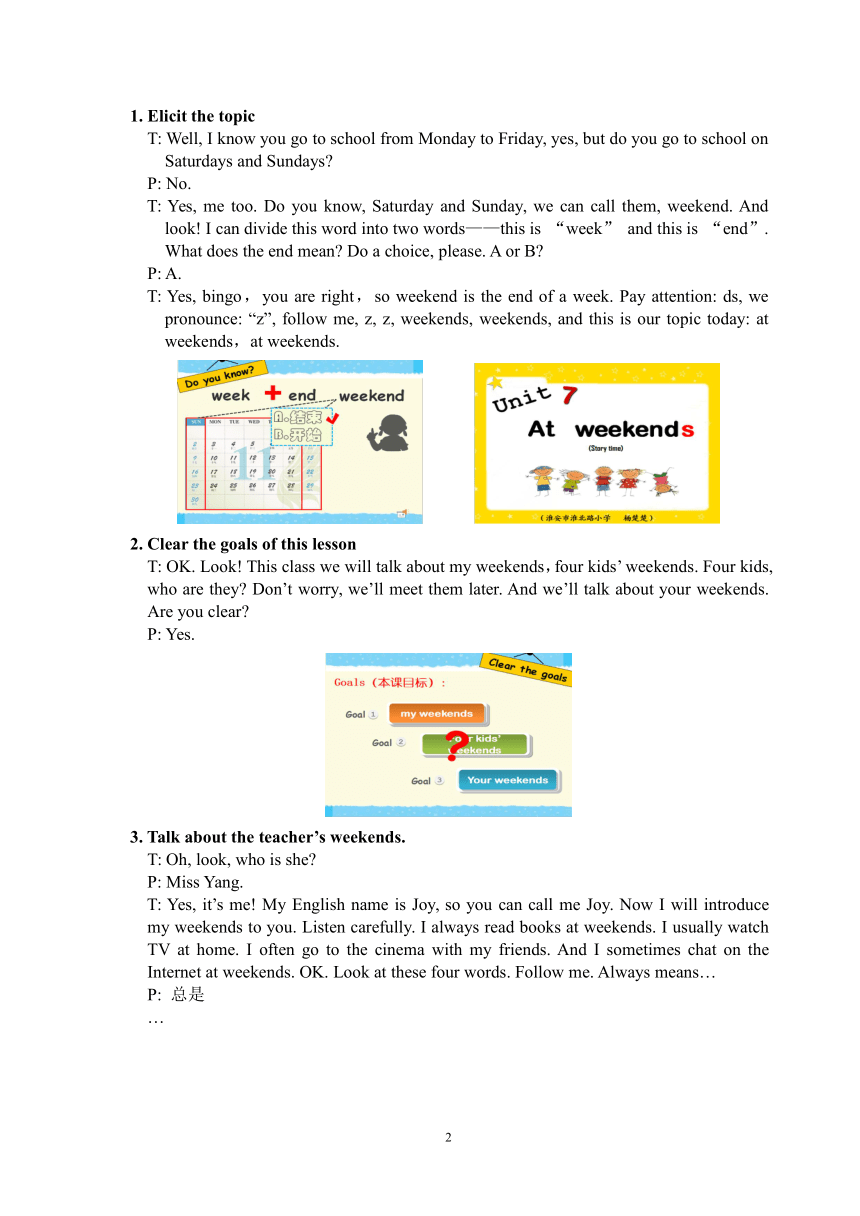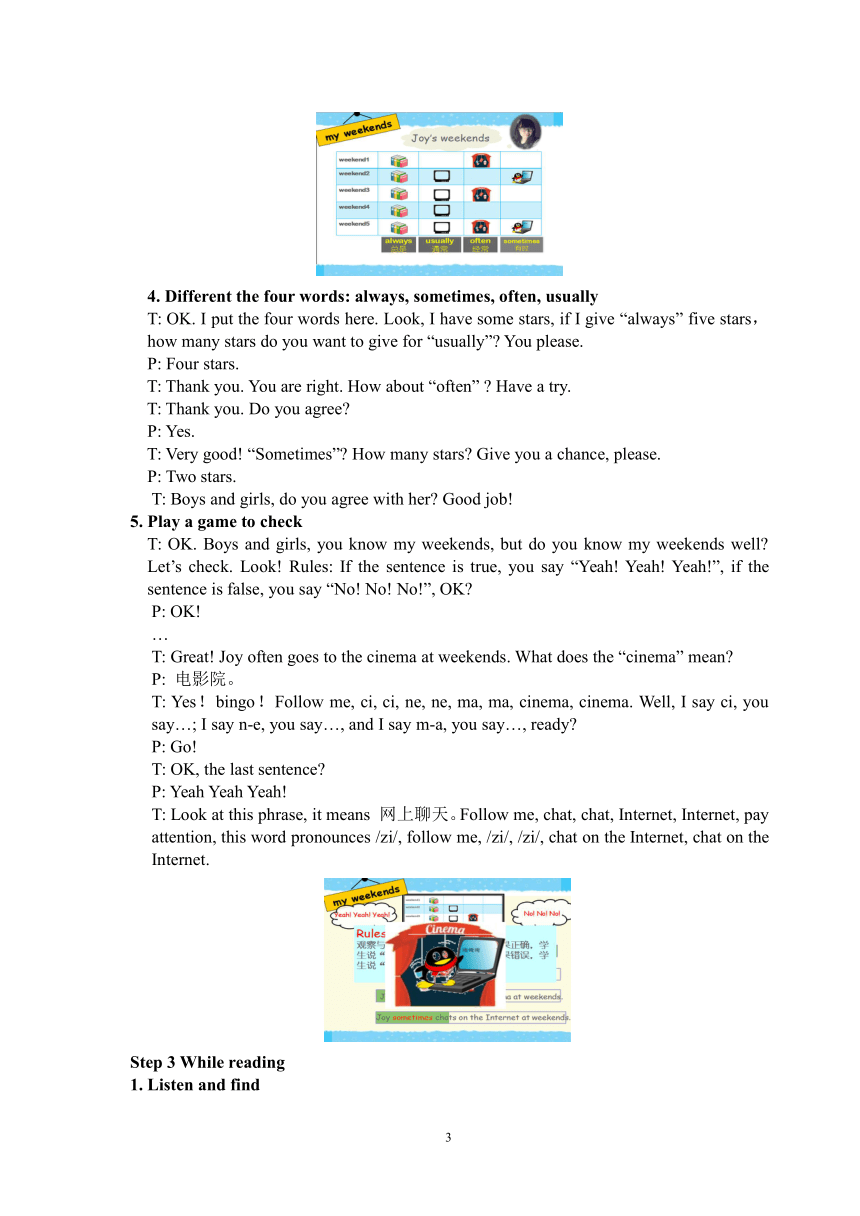Unit 7 At weekends Story time 教案
文档属性
| 名称 | Unit 7 At weekends Story time 教案 |

|
|
| 格式 | zip | ||
| 文件大小 | 4.6MB | ||
| 资源类型 | 教案 | ||
| 版本资源 | 牛津译林版 | ||
| 科目 | 英语 | ||
| 更新时间 | 2019-12-16 00:00:00 | ||
图片预览




文档简介
5A Unit 7 At weekends 第一课时教学设计
Ⅰ 背景信息
材料分析:本节课的学习内容贴合学生的真实生活,能激发学生了解的好奇心和兴趣。
学情分析:学生在三、四年级已经学过一些活动类短语,比如踢足球之类,为今天的学习打下了基础。
Ⅱ 授课类型:Reading
Ⅲ 教学目标?
通过本课的学习,学生能够:
1.很好的理解、掌握单词和句型。
2.通过细读获取文本的详细信息。
3.讨论自己和他人的周末活动。
4. 体验与他人在小组中合作的快乐。
Ⅳ 教学重难点
1.通过细读获取文本的详细信息。
2.讨论自己和他人的周末活动。
Ⅴ 教学准备
多媒体、短语卡片、人物图片
Ⅵ 教学过程
Step 1 Warming up and lead in
1. Sing a song
T: OK. Let’s begin our class. Are you ready? I’m so happy to have classes for you here. First, let’s sing a song. Stand up, just follow me and try to copy me, OK? Don’t be shy, just relax!
P: OK.
The teacher sings the song and do the action.
T:Wow, you are so wonderful today. Thank you, sit down, please.
Step2 Pre-reading
1. Elicit the topic
T: Well, I know you go to school from Monday to Friday, yes, but do you go to school on Saturdays and Sundays?
P: No.
T: Yes, me too. Do you know, Saturday and Sunday, we can call them, weekend. And look! I can divide this word into two words——this is “week” and this is “end”. What does the end mean? Do a choice, please. A or B?
P: A.
T: Yes, bingo,you are right,so weekend is the end of a week. Pay attention: ds, we pronounce: “z”, follow me, z, z, weekends, weekends, and this is our topic today: at weekends,at weekends.
2. Clear the goals of this lesson
T: OK. Look! This class we will talk about my weekends,four kids’ weekends. Four kids, who are they? Don’t worry, we’ll meet them later. And we’ll talk about your weekends. Are you clear?
P: Yes.
3. Talk about the teacher’s weekends.
T: Oh, look, who is she?
P: Miss Yang.
T: Yes, it’s me! My English name is Joy, so you can call me Joy. Now I will introduce my weekends to you. Listen carefully. I always read books at weekends. I usually watch TV at home. I often go to the cinema with my friends. And I sometimes chat on the Internet at weekends. OK. Look at these four words. Follow me. Always means…
P: 总是
…
4. Different the four words: always, sometimes, often, usually
T: OK. I put the four words here. Look, I have some stars, if I give “always” five stars,how many stars do you want to give for “usually”? You please.
P: Four stars.
T: Thank you. You are right. How about “often” ? Have a try.
T: Thank you. Do you agree?
P: Yes.
T: Very good! “Sometimes”? How many stars? Give you a chance, please.
P: Two stars.
T: Boys and girls, do you agree with her? Good job!
5. Play a game to check
T: OK. Boys and girls, you know my weekends, but do you know my weekends well? Let’s check. Look! Rules: If the sentence is true, you say “Yeah! Yeah! Yeah!”, if the sentence is false, you say “No! No! No!”, OK?
P: OK!
…
T: Great! Joy often goes to the cinema at weekends. What does the “cinema” mean?
P: 电影院。
T: Yes!bingo!Follow me, ci, ci, ne, ne, ma, ma, cinema, cinema. Well, I say ci, you say…; I say n-e, you say…, and I say m-a, you say…, ready?
P: Go!
T: OK, the last sentence?
P: Yeah Yeah Yeah!
T: Look at this phrase, it means 网上聊天。Follow me, chat, chat, Internet, Internet, pay attention, this word pronounces /zi/, follow me, /zi/, /zi/, chat on the Internet, chat on the Internet.
Step 3 While reading
1. Listen and find
T: OK. So much for my weekends, now let’s talk about four kids’ weekends. Who are they?
T: OK. Look at this picture. Who is she?
P: Helen.
…
T: OK. Now, please listen carefully, whose weekends are they talking about?
T: Who has got the answer? You please.
P: Helen.
T: Yes, you are clever! What about others?
……
T: Well done! So, now let’s talk about Mike, Helen, Su Hai and Su Yang’s weekends. Ready?
P: Go!
2. Watch and find
(1). Review the activities
T: OK. We know they’re talking about their weekends. What do they do at weekends? Do you want to know? OK, let’s see them one by one.
(2). Watch and get the answer
T: Now, watch the cartoon , please tick their activities. Ready?
P: Go!
T: Have you got the answers?
P: Yes.
T: Good. Let’s check. What do they do at weekends?
The students say each activity and check the answer.
3. Read and find
(1). Read and fill the paper
T: Excellent! I’m proud of you! Next, please open your books, read the text by yourselves and write the kids’ activities on this paper, OK?
P: OK.
(2). Check the answer
T: Time is up. Are you ready?
P: Yes.
T: First, what does Helen do at weekends? You please.
P: Helen always has dancing lessons.
T: I like your answer, sit down, please. Anything else?
P: She sometimes goes to the cinema with her friends.
T: Very good! So much for Helen’s weekends. What about Su Hai and Su Yang’s weekends?
P: They usually visit their grandparents.
T: Yes, you are right. Others?
P: usually play with their cat Kitty.
T: Yes,they usually do these things. What do they often do at weekends?
P: ……….
(此处学生回答一个,老师单击一次,并贴板书。)
4. Read and imitate
T: OK. So much for the four kids’ weekends, let’s move on to the dialogue now. First of all, please look at some important symbols. Please remember, OK?
T: Now please listen to the computer, and read after it.
5. Practice time
(1). I can judge
T: Well, boys and girls, let’s have a rest, OK?
P: OK!
T: Actually, we have played the game just now. If the sentence is right, you say “Yeah!Yeah!Yeah!”. On the contrary, you say “No! No! No!” understand?
P: Yes.
T: Ready?
P: Go!
T: Wow, amazing! All of you did a very good job!
(2). I can say
T: Now it’s your turn. Work in group of 4. Each student says a
sentence about the story. The others judge. If the sentence is right, you say “Yeah! Yeah! Yeah!”. On the contrary, you say “No! No! No!”. Are you ready?
P: Yes!
T: Go!
T: Time is up. I will invite one group to show to others. OK. Your group, stand up!
T: Did they play well? Yes or no?
P: Yes!
T: I have the same feeling like you, great performance! Give them cheers!
Step4 Post reading: The Joy Show
T: Look! Let’s begin today’s Joy show! The topic of the show is “What do you do at weekends”? I’m the host. You are my guests. So who wants to come to the front to have a interview? Good! Come here. Anyone else? OK, you two. Hello,I’m Joy.
P: Hello, I’m…..
T: Oh, …,nice to meet you.
P1: Nice to meet you, too.
T: OK. What do you do at weekends?
P1: I read books at weekends.
…
Step5 Homework
1. Read and try to recite the story.
2. Retell the story to others.
3. Interview and fill the form.
Ⅶ 板书设计:
Unit 7 At weekends
always
usually
often
sometimes
Ⅰ 背景信息
材料分析:本节课的学习内容贴合学生的真实生活,能激发学生了解的好奇心和兴趣。
学情分析:学生在三、四年级已经学过一些活动类短语,比如踢足球之类,为今天的学习打下了基础。
Ⅱ 授课类型:Reading
Ⅲ 教学目标?
通过本课的学习,学生能够:
1.很好的理解、掌握单词和句型。
2.通过细读获取文本的详细信息。
3.讨论自己和他人的周末活动。
4. 体验与他人在小组中合作的快乐。
Ⅳ 教学重难点
1.通过细读获取文本的详细信息。
2.讨论自己和他人的周末活动。
Ⅴ 教学准备
多媒体、短语卡片、人物图片
Ⅵ 教学过程
Step 1 Warming up and lead in
1. Sing a song
T: OK. Let’s begin our class. Are you ready? I’m so happy to have classes for you here. First, let’s sing a song. Stand up, just follow me and try to copy me, OK? Don’t be shy, just relax!
P: OK.
The teacher sings the song and do the action.
T:Wow, you are so wonderful today. Thank you, sit down, please.
Step2 Pre-reading
1. Elicit the topic
T: Well, I know you go to school from Monday to Friday, yes, but do you go to school on Saturdays and Sundays?
P: No.
T: Yes, me too. Do you know, Saturday and Sunday, we can call them, weekend. And look! I can divide this word into two words——this is “week” and this is “end”. What does the end mean? Do a choice, please. A or B?
P: A.
T: Yes, bingo,you are right,so weekend is the end of a week. Pay attention: ds, we pronounce: “z”, follow me, z, z, weekends, weekends, and this is our topic today: at weekends,at weekends.
2. Clear the goals of this lesson
T: OK. Look! This class we will talk about my weekends,four kids’ weekends. Four kids, who are they? Don’t worry, we’ll meet them later. And we’ll talk about your weekends. Are you clear?
P: Yes.
3. Talk about the teacher’s weekends.
T: Oh, look, who is she?
P: Miss Yang.
T: Yes, it’s me! My English name is Joy, so you can call me Joy. Now I will introduce my weekends to you. Listen carefully. I always read books at weekends. I usually watch TV at home. I often go to the cinema with my friends. And I sometimes chat on the Internet at weekends. OK. Look at these four words. Follow me. Always means…
P: 总是
…
4. Different the four words: always, sometimes, often, usually
T: OK. I put the four words here. Look, I have some stars, if I give “always” five stars,how many stars do you want to give for “usually”? You please.
P: Four stars.
T: Thank you. You are right. How about “often” ? Have a try.
T: Thank you. Do you agree?
P: Yes.
T: Very good! “Sometimes”? How many stars? Give you a chance, please.
P: Two stars.
T: Boys and girls, do you agree with her? Good job!
5. Play a game to check
T: OK. Boys and girls, you know my weekends, but do you know my weekends well? Let’s check. Look! Rules: If the sentence is true, you say “Yeah! Yeah! Yeah!”, if the sentence is false, you say “No! No! No!”, OK?
P: OK!
…
T: Great! Joy often goes to the cinema at weekends. What does the “cinema” mean?
P: 电影院。
T: Yes!bingo!Follow me, ci, ci, ne, ne, ma, ma, cinema, cinema. Well, I say ci, you say…; I say n-e, you say…, and I say m-a, you say…, ready?
P: Go!
T: OK, the last sentence?
P: Yeah Yeah Yeah!
T: Look at this phrase, it means 网上聊天。Follow me, chat, chat, Internet, Internet, pay attention, this word pronounces /zi/, follow me, /zi/, /zi/, chat on the Internet, chat on the Internet.
Step 3 While reading
1. Listen and find
T: OK. So much for my weekends, now let’s talk about four kids’ weekends. Who are they?
T: OK. Look at this picture. Who is she?
P: Helen.
…
T: OK. Now, please listen carefully, whose weekends are they talking about?
T: Who has got the answer? You please.
P: Helen.
T: Yes, you are clever! What about others?
……
T: Well done! So, now let’s talk about Mike, Helen, Su Hai and Su Yang’s weekends. Ready?
P: Go!
2. Watch and find
(1). Review the activities
T: OK. We know they’re talking about their weekends. What do they do at weekends? Do you want to know? OK, let’s see them one by one.
(2). Watch and get the answer
T: Now, watch the cartoon , please tick their activities. Ready?
P: Go!
T: Have you got the answers?
P: Yes.
T: Good. Let’s check. What do they do at weekends?
The students say each activity and check the answer.
3. Read and find
(1). Read and fill the paper
T: Excellent! I’m proud of you! Next, please open your books, read the text by yourselves and write the kids’ activities on this paper, OK?
P: OK.
(2). Check the answer
T: Time is up. Are you ready?
P: Yes.
T: First, what does Helen do at weekends? You please.
P: Helen always has dancing lessons.
T: I like your answer, sit down, please. Anything else?
P: She sometimes goes to the cinema with her friends.
T: Very good! So much for Helen’s weekends. What about Su Hai and Su Yang’s weekends?
P: They usually visit their grandparents.
T: Yes, you are right. Others?
P: usually play with their cat Kitty.
T: Yes,they usually do these things. What do they often do at weekends?
P: ……….
(此处学生回答一个,老师单击一次,并贴板书。)
4. Read and imitate
T: OK. So much for the four kids’ weekends, let’s move on to the dialogue now. First of all, please look at some important symbols. Please remember, OK?
T: Now please listen to the computer, and read after it.
5. Practice time
(1). I can judge
T: Well, boys and girls, let’s have a rest, OK?
P: OK!
T: Actually, we have played the game just now. If the sentence is right, you say “Yeah!Yeah!Yeah!”. On the contrary, you say “No! No! No!” understand?
P: Yes.
T: Ready?
P: Go!
T: Wow, amazing! All of you did a very good job!
(2). I can say
T: Now it’s your turn. Work in group of 4. Each student says a
sentence about the story. The others judge. If the sentence is right, you say “Yeah! Yeah! Yeah!”. On the contrary, you say “No! No! No!”. Are you ready?
P: Yes!
T: Go!
T: Time is up. I will invite one group to show to others. OK. Your group, stand up!
T: Did they play well? Yes or no?
P: Yes!
T: I have the same feeling like you, great performance! Give them cheers!
Step4 Post reading: The Joy Show
T: Look! Let’s begin today’s Joy show! The topic of the show is “What do you do at weekends”? I’m the host. You are my guests. So who wants to come to the front to have a interview? Good! Come here. Anyone else? OK, you two. Hello,I’m Joy.
P: Hello, I’m…..
T: Oh, …,nice to meet you.
P1: Nice to meet you, too.
T: OK. What do you do at weekends?
P1: I read books at weekends.
…
Step5 Homework
1. Read and try to recite the story.
2. Retell the story to others.
3. Interview and fill the form.
Ⅶ 板书设计:
Unit 7 At weekends
always
usually
often
sometimes
